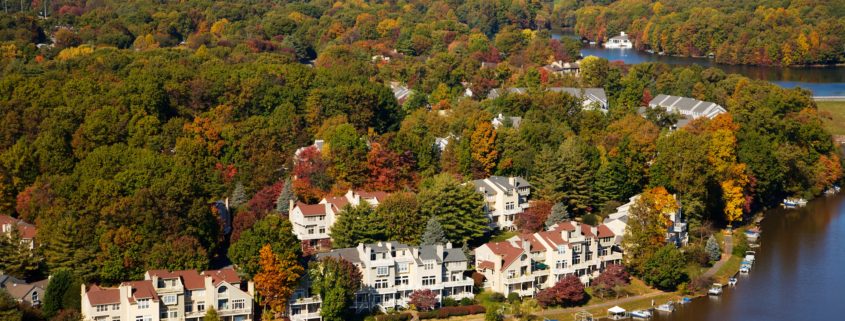2022 Report Updates Status of Reston’s Environmental Attributes
Photo: Provided by Northern Virginia Aerials, Reston
Article provided by Master Gardener intern/Master Naturalist Robin Duska
Ever wonder about how to measure the effects of development on the environment?
In 2017, Reston’s Environmental Advisory Committee set out to establish one approach: A baseline against which the desirability and effect of changes resulting from development or other causes could be assessed. Today, as Reston, like much of Fairfax County, accommodates ever higher population densities, it strives to maintain elements of its natural areas, water features, woodlands, and open spaces that give its residents a sense of well-being, benefit the economy, and provide a host of critically important ecological services.
The 2022 Reston Association State of the Environment Report (RASER) addresses 23 specific natural resources or environmental topics, to include many that may be of particular interest to Master Naturalists such as Streams, Stormwater, Urban Forests, Landscaping & Urban Agriculture, Birds, Wildlife Management Issues, and Light Pollution. Although Reston-focused, many of the data apply more generally to Fairfax County.
For each topic, Background information on the subject is provided, followed by a description of Existing Conditions in Reston. Conclusions are then drawn using colored traffic light icons to indicate whether the overall condition of the topic is considered good (green), fair (yellow), poor (red), or undetermined (black). RASER’s separate 2022 Report Card & Recommendations document provides a list of recommendations to better protect or improve upon Reston’s environmental conditions. It also annually
tracks the progress made on implementing previous RASER recommendations and is briefed each year to Reston’s Board of Directors. Given Reston is a census-designated area rather than a town, the Board is Reston’s decision-making body.
RASER is designed to complement the information Fairfax County’s Environmental Quality Advisory Council reports in its Annual Report on the Environment. Master Naturalists can access RASER here to read the lengthy full report, an executive summary of its conclusions, or individual chapters such as those listed above as well as the Report Card & Recommendations. Other Reston-produced environmental information is available here, including a 2021 report on best management practices for
invasive plants and Reston’s Biophilic Pledge.
The RASER project team co-led by Master Naturalist Doug Britt and Master Gardener intern/Master Naturalist Robin Duska, will welcome additional volunteers to produce the 2024 edition of RASER. Reston residents can also volunteer to serve on Reston’s Environmental Advisory Committee (EAC). To volunteer for either or both, please contact EAC’s Doug Britt at pdbritt68@gmail.com or Surekha Sridhar at ss.eac@outlook.com.


